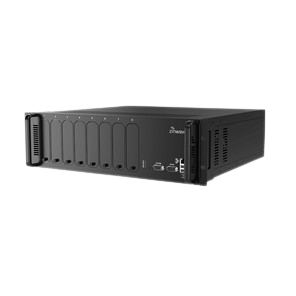What is Private 5G?
The Rise of Private 5G
Businesses today are handling more data, devices, and digital tools than ever before, and traditional networks aren’t always keeping up. WiFi can get bogged down in crowded environments. Public cellular networks aren’t always reliable indoors. That’s where private 5G is starting to shine.
As demand grows for secure, high-performance connectivity, more businesses are exploring private 5G networks to support everything from automation to real-time data sharing. It’s a shift that’s reshaping how businesses stay connected.
In this article, we’ll break down what private 5G is, how it works, and why more businesses are investing in it.
We fix poor cell phone signal! Find the right signal booster for you:




In this guide:
- What is a Private 5G Network?
- How Does a Private 5G Network Work
- TWhy are Businesses Interested in 5G Private Networks?
- Private 5G vs. Other Networks: How it Compares
- Private 5G Use Cases
- The Future is Private 5G
What is a Private 5G Network?
A private 5G network is a dedicated cellular network built for a specific organization—not shared with the general public. It uses the same technology you’ll find in a public mobile network, but the infrastructure, settings, and data traffic are all controlled by the business or institution that owns it.
Think of it like having your own personal 5G lane, separate from traffic jams on the public highway. You decide who connects, how it’s configured, and what data flows through it.
Private 5G can be deployed indoors or outdoors, across factories, campuses, hospitals, ports, and more. Unlike WiFi or public cellular, it’s built to deliver higher reliability, stronger security, and ultra-low latency, all of which are critical in modern enterprise settings.
Some key characteristics of private 5G networks include:
- Dedicated infrastructure (like small cells, radios, and a core network)
- Custom configuration and control over devices, users, and performance
- Use of licensed, shared, or unlicensed spectrum
- Higher reliability and mobility than traditional WiFI
Whether it’s supporting robotics in a warehouse or enabling secure communication across a university campus, private 5G gives organizations the power to design a network tailored to their needs.
How Does a Private 5G Network Work?
At a basic level, a private 5G network operates just like a private one, but with one key difference: it’s built and managed specifically for a single organization. That means the business (or the technology partner) controls everything from the physical infrastructure to the software that runs the network.
Here’s a closer look at how that works:
- Radio Access Network (RAN): This includes small cell base stations and antennas strategically installed around the site. The antennas are what actually transmit and receive the 5G radio signals between the network and user devices. These components work together to create a blanket of high-speed wireless coverage over a defined area, whether it’s an open warehouse, a multi-story hospital, or an outdoor yard.
- User Equipment: These are the devices that connect the network, anything from mobile phones and tablets to sensors, machines, robots, or autonomous vehicles.
- Core Network: This is the brain of the operation. It handles the data routing, network management, security policies, and device authentication. In a private 5G setup, this core can be deployed on premises for full control or hosted in the cloud for more flexibility.
- Spectrum: Private 5G networks use licensed, unlicensed, or shared spectrum, depending on local regulations and deployment choices. Spectrum access is what allows the network to operate independently from public carriers and avoid interference.
As data moves between devices and the core network, the system continuously manages traffic, ensures security, and adapts to bandwidth demands in real time. This creates a stable, low-latency environment, even with thousands of connected devices operating at once.
Because private 5G networks are localized, they’re often stronger indoors than public cellular networks and more consistent than WiFi, especially in large or high-interference spaces. Everything is tailored to the specific needs of the organization, from the coverage area and capacity to the level of security and quality of service.
Key Deployment Models
Different organizations have different needs and budgets. That’s why there are several ways to set up a private 5G network:
- Wholly Owned: The business controls everything, from the radios to the core network. This offers the highest level of customization and security but also comes with the highest upfront investment.
- Hybrid (On-site RAN/Cloud Core): The radio access network (RAN) is deployed on-premise, but the core network is managed in the cloud, offering a balance of control and flexibility.
- Network Slicing: Instead of building an entirely separate network, businesses “rent” a slice of an existing public 5G network from a mobile carrier. It’s a faster, less expensive option, but with less control.
- Neutral Host Network: A shared infrastructure that supports multiple tenants or carriers, ideal for places like stadiums, airports, or malls where several networks need to coexist.
The right deployment model depends on your priorities, whether it’s cost, control, security, or simplicity.

Powerful DAS solution designed to blanket enterprise buildings of any size with Private 5G (subscription required) coverage in addition to AT&T, T-Mobile, and Verizon reception. All of your business's connectivity needs are supported by one system.
Learn MoreWhy are Businesses Interested in 5G Private Networks?
Businesses are turning to private 5G for more than just control. It’s about having the speed, security, and network visibility needed to support modern operations.
Today’s enterprises rely on real-time data, connected devices, and automation. But traditional WiFi and public cellular networks can fall short, especially in high-density or mission-critical environments.
Here’s what makes private 5G networks so appealing:
Reliability and Low Latency
Private 5G offers ultra-fast data transfer with minimal lag, ideal for industries where timing is critical. Think robotics in a warehouse, remote-controlled machines, or augmented reality tools for field technicians.
Greater Control
Because the business owns or manages the network, it can prioritize certain applications, set performance standards, and decide who gets access. That’s a huge advantage over public networks, where you’re sharing bandwidth with everyone else.
Stronger Security
With data staying local (and not traveling over public carrier networks), sensitive information is less exposed. You can build in your own security protocols, firewalls, and access controls based on your organization’s specific needs.
Scalability
Private 5G networks can support thousands of connected devices without the showdowns that often happen on WiFI as usage grows.
Whether it’s a hospital protecting patient data or a manufacturing plant keeping autonomous equipment running smoothly, private 5G gives organizations the power and flexibility to build networks that work for them, not around them.
Private 5G vs. Other Networks: How it Compares
When exploring private 5G, it helps to understand how it stacks up against other network types, like public cellular, private LTE, and WiFi. Each has its place, but the right choice depends on your business’s goals, environment, and security needs.
Private 5G vs. Public Cellular
While public and private 5G networks use the same core wireless technology, the way they're owned, managed, and used is very different.
Here’s how they compare:
| Network Ownership |
|
| Network Access |
|
| Coverage |
|
| Use Cases |
|
| Security |
|
Private 5G vs. Private LTE
Private LTE (Long-Term Evolution) was the go-to option for enterprise cellular before 5G entered the picture, and it’s still a viable choice in many settings. Here’s the breakdown:
| Similarities |
|
| Differences |
|
Private LTE remains a practical choice for businesses in areas with limited 5G coverage or high-speed internet infrastructure, as well as those that don’t need ultra-low latency. Private LTE is often more affordable and easier to deploy. It’s still widely used in logistics, utilities, and outdoor environments.
Private 5G vs. WiFi
WiFi is everywhere, and for good reason. But it wasn’t built to handle the level of mobility, security, or device density that many modern businesses require.
Here’s an overview of how private 5G vs WiFi compare:
| Feature | Private 5G | WiFi |
| Coverage | Wide area with fewer access points | Limited to small areas, more APs needed |
| Reliability | Built for stability, even in complex environments | Prone to interference and congestion |
| Mobility | Seamless handoffs between cells | Can drop connections when roaming |
| Security | SIM-based access, carrier-grade encryption | Password-protected, more vulnerable |
| Use Cases | Ideal for mission-critical operations | Ideal for casual or desktop use |
Can they work together? Absolutely. In most environments, private 5G and WiFi are designed to complement each other, not compete. WiFi still plays a critical role in providing internet access and supporting everyday connectivity needs, especially for laptops, guest networks, and general office use. Meanwhile, private 5G steps in for high-demand, high-mobility, or latency-sensitive applications, like autonomous vehicles, security systems, or remote diagnostics.
In fact, some private 5G deployments, like Neutral Host Networks, rely on strong wired or WiFi connections to operate effectively. The two technologies often work side by side to provide a layered, dependable coverage across different use cases.
Private 5G Use Cases
So who’s actually using private 5G and why?
From factory floors to hospital wings, more industries are turning to private 5G networks to handle mission-critical operations. These businesses need fast, secure, and reliable connectivity that traditional WiFi or public networks just can’t guarantee.
Here are a few of the top sectors investing in 5G enterprise private networks:
Manufacturing
Private 5G supports real-time monitoring, robotics, and automation on the production line. With low latency and reliable coverage, machines can communicate faster, reducing downtime and improving precision.
Example: A car manufacturer uses private 5G to control robotic arms and track assembly-line performance in real time, without any signal dropouts.
Logistics & Warehousing
In large fulfillment centers or outdoor yards, private 5G enables autonomous vehicles, real-time inventory tracking, and connected scanners that work without lag, even across wide areas.
Example: A warehouse deploys private 5G to guide driverless forklifts safely through narrow aisles while updating stock levels on the fly.
Hospitality & Events
Hotels, resorts, and event venues use private 5G to enhance guest experiences and improve operations behind the scenes, such as staff communications, mobile check-ins, or smart building systems.
Example: A resort installs a private 5G network to support contactless check-in, digital room keys, and seamless guest WiFi, all while keeping staff devices on a separate secure network.
Healthcare
Private 5G helps hospitals and clinics securely transmit patient data, run remote diagnostics, and connect medical devices, even in hard-to-cover areas like basements or surgical wings.
Example: A hospital uses private 5G to support real-time imaging in operating rooms and remote consultations for rural clinics.
Education
College campuses and K-12 schools benefit from campus-wide coverage, secure staff communication, and support for online learning tools, even during peak usage times.
Example: A university builds a private 5G network to connect smart classrooms, secure student data, and support AR/VR applications in STEM programs.
In all of these settings, private 5G isn’t just a nice-to-have. It’s becoming essential for the kind of speed, security, and scalability modern operations demand.
The Future is Private (5G)
Private 5G may still be a newer concept for many businesses, but it’s quickly becoming a game-changer in enterprise connectivity. By combining high-speed performance, low latency, and full control, private 5G networks are giving businesses the ability to build smarter, safer, and more efficient operations, all from the ground up.
Whether you’re exploring 5G for a warehouse, hospital, campus, or beyond, the key is finding a solution that fits your goals and can grow with them.
Want to learn more about whether private 5G is right for your business? Give us a call at 1-800-887-1961 or reach out to our team at pro@wilsonamplifiers.com. We’re here to help you explore your options and find the best fit for your network needs.
Interested in Learning More? Check Out Our Signal Boosting Info Center


Money Back Guarantee

Technical Support